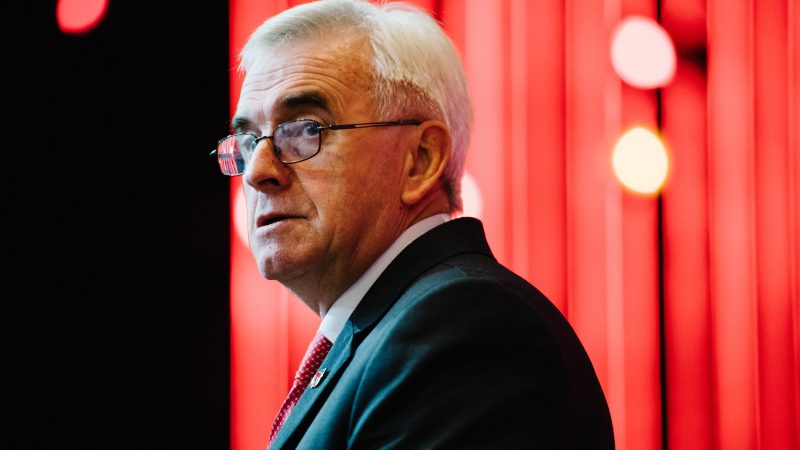
John McDonnell has urged Labour left members not to let themselves be “portrayed as oppositionists, shouting from the sidelines” and instead “make sure that we win every political debate around the policy issues that we now confront”.
In an interview with Antonello Guerrera of Italian newspaper La Repubblica, the former Shadow Chancellor warned the party’s left flank against allowing itself to become isolated, saying: “We mustn’t alienate people within the party.”
He reminded members that Keir Starmer won the Labour leadership election earlier this year “on the basis of adopting a template policy programme which was drawn from the last two Labour manifestos” in the 2017 and 2019 general elections.
McDonnell said: “The most important thing for the left now is not to allow itself to be portrayed as oppositionists, shouting from the sidelines, shouting through the letterbox, that sort of thing.
“We mustn’t allow ourselves to be isolated or in any way, and we mustn’t alienate people within the party of the majority of the Labour Party members.”
He argued that while most members are “willing to give Keir Starmer a chance to see how we can really keep the party together and develop it”, the majority “don’t want any retreat from the radicalism of Jeremy Corbyn”.
McDonnell also said that some members within the party had been alienated by the leadership’s statements on certain issues that have “not been carefully worded or well chosen”, but said people were not leaving Labour “on any mass scale”.
Starmer faced a backlash earlier this year when he referred to Black Lives Matter as a “moment” in a BBC News interview. He later said he regretted doing so, and had meant that it was a “defining moment” in race relations.
Commenting on the 2019 general election defeat, the former Shadow Chancellor and Corbyn ally described it as an “electoral setback” but insisted that there had been “significant electoral support for the radical forces”.
The former Shadow Chancellor also commented on the recently published Left Out: The Inside Story of Labour under Corbyn, describing its claims that he argued with the former leader as “rubbish”. He slammed the authors as “gossip columnists”.
Asked why he had not engaged with the writers, he said: “I just ignored them completely because why would I cooperate with the Murdoch press who have been trying to assassinate Jeremy’s character for five solid years? I refused completely!”
McDonnell said it was right that Starmer had visited Jewish community groups after being elected as in April, but added that “Jeremy did the same thing” and said the former Labour leader had an “open door”.
The left figurehead told La Repubblica: “Of course, Keir was right to visit the Jewish organisations! But Jeremy had an open door policy to Jewish organisations and was willing to meet them on whatever basis as well.”
He described Starmer’s side-stepping of the Brexit issue in recent debates as a “good choice” and said the main opposition party should not let the Prime Minister use Brexit as a “smokescreen for his failures on Covid”.
McDonnell also compared Boris Johnson to Donald Trump and said that Johnson’s politics was “proto-fascism”. He added that the world is “in quite a dangerous moment when it comes to the development of the forms of the right”.
The MP for Hayes and Harlington last month praised the new Labour leader’s approach to opposition during the coronavirus pandemic as “exactly right” during a Times Radio interview.
He said: “He’s approached the government in a constructive way – and we’ve got to get through this crisis together – but he can’t help but point out failure after failure. And people are getting pretty angry.”
But the Labour left figure added: “Sometimes I’ll want the party to be a bit more vociferous on some of these things, but that’s a matter of style. As long as we get the point across.”




More from LabourList
‘It’s one year since I became Britain’s youngest MP. Here’s what I’ve achieved so far’
Tribute: ‘David Lipsey’s joie de vivre is missing in Labour politics today’
Ellie Reeves: ‘One year in, the next phase begins – focused on living standards’